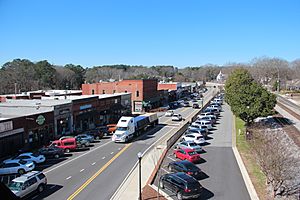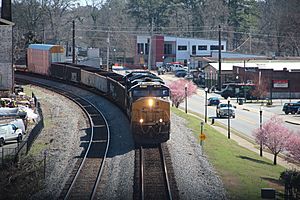Acworth, Georgia facts for kids
Quick facts for kids
Acworth, Georgia
|
|||
|---|---|---|---|

Downtown Acworth (2020)
|
|||
|
|||
| Motto(s):
The Lake City
|
|||
| Country | United States | ||
| State | Georgia | ||
| County | Cobb | ||
| Incorporated | 1860 | ||
| Area | |||
| • Total | 9.79 sq mi (25.36 km2) | ||
| • Land | 9.09 sq mi (23.54 km2) | ||
| • Water | 0.70 sq mi (1.81 km2) | ||
| Population
(2020)
|
|||
| • Total | 22,440 | ||
| • Density | 2,468.65/sq mi (953.11/km2) | ||
| Time zone | UTC-5 (EST) | ||
| • Summer (DST) | UTC-4 (EDT) | ||
| ZIP Code |
30101, 30102
|
||
| Area code |
|
||
| FIPS code | 13-00408 | ||
Acworth is a city in Cobb County, Georgia, United States. It's part of the larger Atlanta metropolitan area. In 2020, about 22,440 people lived here. This was an increase from 20,425 people in 2010.
Acworth is located near the North Georgia mountains. It sits by the banks of Lake Acworth and Lake Allatoona, which are connected to the Etowah River. Because of these lakes, Acworth is often called "the Lake City." Some areas outside the main city, in Bartow, Cherokee, and Paulding counties, are also known as Acworth.
Contents
History of Acworth
Early Days and Naming
The land where Acworth is today was once part of the Cherokee Nation. In 1831, after the Cherokee people were forced to leave their homes in what is known as the Trail of Tears, the area became part of Cobb County.
The Western and Atlantic Railroad was built through the town in 1840. This railroad was very important for transportation and trade. A special stop was made here for trains to get water.
The town got its name in 1843 from Joseph L. Gregg. He was an engineer for the Western & Atlantic Railroad. He named the town after his own hometown, Acworth, New Hampshire. That town was named after Sir Jacob Acworth, who was a surveyor for the Royal Navy.
In 1851, telegraph lines reached Acworth, connecting it to other places.
Schools and Growth
A private school for white students opened in 1852. Later, another private school operated from 1899 to 1935. After 1935, these schools joined the Cobb County School District. Until then, high school students from Acworth had to pay to attend.
For many years, Black students were educated separately in a grammar school. The closest high school for Black students was in Atlanta. Later, the county provided buses to take them to a separate school in Marietta. All students were schooled separately until 1967.
Acworth officially became an incorporated city on December 1, 1860. This meant it had its own local government.
The Civil War and Recovery
During the American Civil War, many volunteers from Acworth joined the fight. They formed groups like Company A ("Acworth Infantry") and Company C ("Invincibles").
The Union forces captured Acworth on June 6, 1864. Union soldiers called it "Little Shanty." This was because it was smaller than the next town south, "Big Shanty," which is now called Kennesaw. The town was under military rule for six months.
On November 13, 1864, General W. T. Sherman's army burned down most of the town. Only 12 homes and one church were saved. The people of Acworth lost almost everything.
By the 1880s, the town had mostly recovered. Growing Cotton was very popular from the 1890s to the 1920s. However, during the Great Depression, cotton prices dropped very low. This caused cotton farming to stop in Acworth and all of Cobb County.
Modern Developments
For a long time, the railroad tracks in Acworth acted as a dividing line. African Americans lived on one side, and white people lived on the other. There were not many public events where everyone could mix. When a movie theater opened in the 1930s, Black moviegoers had to use a separate entrance to reach the balcony, while white moviegoers sat on the main floor.
In 1907, volunteers created a fire department to protect the town. From 1905 to the 1980s, three textile mills operated in Acworth. At their busiest, they employed about 800 workers.
Main Street was paved in 1926. When the entire Dixie Highway (which included parts of old U.S. Route 41) was paved in 1929, over 800 tourist cars drove through the city every day.
When the Etowah River was dammed to create Lake Allatoona, people worried that nearby land would become a swamp. They asked for a second dam, which led to the creation of Lake Acworth in the 1950s. Both lakes became popular places for tourists.
The city greatly improved its water and sewage systems in the late 1940s. In 1956, Acworth elected its first woman mayor, Mary McCall. She also served from 1961 to 1966.
In 2010, Acworth was recognized as an All-America City Award winner by the National Civic League. This award celebrates communities that work together to solve problems.
In 2011, parts of the movie Footloose were filmed in downtown Acworth. The Acworth Presbyterian Church and the mayor's house were used in the movie. In 2017, Acworth hosted the WWA Wakeboarding National Championship.
Geography
Acworth is located in the foothills of the North Georgia mountains. It is found along the southeastern banks of Lake Acworth and Lake Allatoona, which are part of the Etowah River. The city of Kennesaw is to the southeast. To the north are Bartow and Cherokee counties.
Interstate 75 passes through the northern part of Acworth. You can get on or off I-75 at exits 277 and 278. From Acworth, downtown Atlanta is about 34 miles (55 km) southeast. Chattanooga, Tennessee, is about 88 miles (142 km) northwest.
U.S. Route 41 and Georgia State Route 92 also run through the city. GA-92 goes east about 12 miles (19 km) to Woodstock and south about 18 miles (29 km) to Hiram. US-41 is west of the city. It leads southeast about 6 miles (10 km) to Kennesaw and northwest about 12 miles (19 km) to Cartersville.
The city covers a total area of about 22.7 square kilometers (8.8 sq mi). Most of this is land, and about 1.4 square kilometers (0.5 sq mi) is water. Some areas outside the main city limits, in Bartow, Cherokee, and Paulding counties, use an Acworth mailing address.
Population and People
| Historical population | |||
|---|---|---|---|
| Census | Pop. | %± | |
| 1880 | 633 | — | |
| 1890 | 815 | 28.8% | |
| 1900 | 937 | 15.0% | |
| 1910 | 1,043 | 11.3% | |
| 1920 | 1,117 | 7.1% | |
| 1930 | 1,163 | 4.1% | |
| 1940 | 1,267 | 8.9% | |
| 1950 | 1,466 | 15.7% | |
| 1960 | 2,359 | 60.9% | |
| 1970 | 3,929 | 66.6% | |
| 1980 | 3,648 | −7.2% | |
| 1990 | 4,519 | 23.9% | |
| 2000 | 13,422 | 197.0% | |
| 2010 | 20,425 | 52.2% | |
| 2020 | 22,440 | 9.9% | |
| U.S. Decennial Census 1850-1870 1870-1880 1890-1910 1920-1930 1940 1950 1960 1970 1980 1990 2000 2010 2020 |
|||
Acworth has grown quite a bit over the years. In 2020, the city had 22,440 people living there. There were 8,337 households and 5,470 families.
The people living in Acworth come from many different backgrounds. The community is made up of people from various racial and ethnic groups, making it a diverse place.
Education
Public schools in Acworth are managed by the Cobb County School District.
Public Schools
- Acworth Elementary School
- Baker Elementary School
- Ford Elementary School
- Frey Elementary School
- McCall Primary School
- Pickett's Mill Elementary School
- Pitner Elementary School
- Barber Middle School
- Durham Middle School
- Allatoona High School
- North Cobb High School
Private Schools
- North Cobb Christian School
Transportation

Major Roads
The main road through the center of Acworth is Main Street. It's also known as "Old 41" because it used to be the route for US 41. State Route 92 and the newer Highway 41 pass through the southern part of the city. The Seven Hills Connector is a new road that connects South Acworth to Paulding County. Bells Ferry Road also runs through Acworth and other nearby cities like Kennesaw and Marietta.
Walking and Biking Paths
- Acworth Trail
- Graves Path
Notable People
Many interesting people have connections to Acworth, including:
- Johnny Archer, a professional pool player
- Jason Bohn, a professional golfer
- Angie Bowie, an actress and model
- Warren Creavalle, a professional soccer player
- Robby Ginepri, a former professional tennis player
- Grant Henry, an artist and businessman
- Scotti Madison, a former professional baseball player
- Jordan Matthews, a soccer player
- Larry Nelson, a former professional golfer
- Bronson Rechsteiner, a professional wrestler
- Bobby Reynolds, a former professional tennis player
- Ranger Ross, a former professional wrestler
- Clarke Schmidt, a professional baseball player
- Musa Smith, a former NFL running back
- Rick Steiner, a former professional wrestler
- Darren Waller, an NFL tight end
- Raleigh Webb, an NFL player
- Aiden Zhane, a contestant from RuPaul's Drag Race
See also
 In Spanish: Acworth para niños
In Spanish: Acworth para niños
 | Leon Lynch |
 | Milton P. Webster |
 | Ferdinand Smith |



